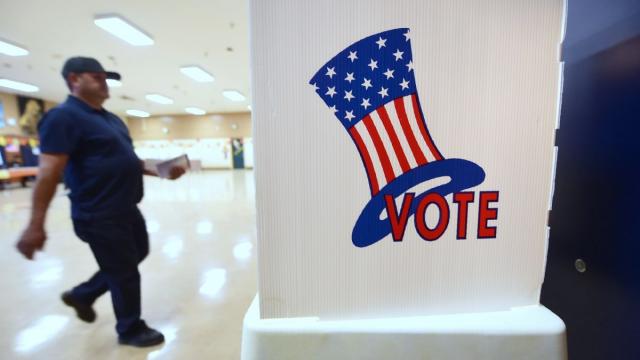
Texas’s electoral practices have frequently become mired in litigation. Photograph: Frederic J. Brown/AFP/Getty Images
Civil rights groups have launched lawsuits accusing Texas officials of compiling a flawed list of voters that could see thousands of naturalized citizens wrongly expunged from electoral rolls, sparking a fierce political fight over alleged voter suppression.
Four Texas-based organizations are plaintiffs in a lawsuit filed on Monday that asks a federal court to stop the state from enacting an “unlawful purge” based on the flagging of about 95,000 people as potentially illegally registered to vote.
It follows legal action initiated last week by Hispanic rights groups who contend the state is pursuing a voter suppression tactic that is likely to have a strong impact on minorities’ democratic rights.
“This list is simply a way to target U.S. citizens who are foreign-born as opposed to being any genuine effort to identify non-U.S. citizens on the voter rolls,” said Nina Perales, vice-president of litigation for the Mexican American Legal Defense and Educational Fund.
As part of an eleven-months long effort by the office of the Texas secretary of state and the Texas department of public safety to identify suspected voter fraud, officials produced a list of names by cross-referencing voter registration information with the details of people who said they were not U.S. citizens when obtaining a drivers’ license. Of 95,000 names, 58,000 people had voted as long ago as 1996, the state said.
The state sent the data to counties for investigation along with an advisory on January 25 cautioning them that the records “will need to be treated as WEAK matches.”
It swiftly became clear that many were wrongly flagged, but not before leading Texas Republicans seized on the list and insinuated that it signified criminality on a massive scale. The Texas Attorney General, Ken Paxton, trumpeted the news with a Twitter post that began: “VOTER FRAUD ALERT.”
“Thanks to Attorney General Paxton and the secretary of state for uncovering and investigating this illegal vote registration. I support prosecution where appropriate,” replied the governor, Greg Abbott.
Misleading headlines soon attracted the attention of Donald Trump in a tweet that incorrectly interpreted the data:
“58,000 non-citizens voted in Texas, with 95,000 non-citizens registered to vote. These numbers are just the tip of the iceberg. All over the country, especially in California, voter fraud is rampant. Must be stopped. Strong voter ID! @foxandfriends”
President Trump has made oft-repeated and oft-debunked allegations of widespread cheating in the 2016 presidential election, in which his Democratic rival won the popular vote.
“The fact that somebody used to be a non-U.S. citizen and then later registers to vote is not evidence that the person is fraudulently registered. It’s evidence that the person has naturalized,” Perales said. “When you look at who is naturalizing in Texas, approximately half are Latino and 25% more are Asian American. And so this is a very targeted attack on voters of color.”
Registered voters who receive letters querying their citizenship have 30 days to respond with proof of eligibility, raising the possibility that some will not reply and be struck from the rolls.
Some civil rights advocates suspect the list’s accuracy is of less concern to Republicans than its potential to feed anti-immigrant prejudices and, in a state with a long history of voter suppression, intimidate the growing pool of non-white voters.
“This exercise is a thinly veiled attempt to advance the voter fraud myth to justify restrictive voter requirements and suppress voting rights,” Sophia Lakin, staff attorney with the American Civil Liberties Union’s Voting Rights Project, said in a statement.
Spokespeople for Paxton and David Whitley, the Texas secretary of state, did not respond to requests for comment.
Julieta Garibay, 38, a naturalized U.S. citizen in Austin who is originally from Mexico, said she contacted officials who told her she is on the list. “I refuse to stay quiet. I’m not going to be bullied out of voting. It is my right and my duty to go out and vote,” she said. She decided to join one of the lawsuits as a plaintiff. “It’s outrageous that someone will come out and say ‘you committed voter fraud’,” she said. “I’m more than insulted – I feel mad.”
Texas’s electoral practices have frequently become mired in litigation, from the way it draws its electoral boundaries to the strict voter ID lawpassed in 2011.
Like Trump, influential Texas politicians have frequently alleged that voter fraud is rampant while failing to provide proof. The handful of illegal voting cases to emerge have been zealously prosecuted, even when it appears that they were unwitting.
Originally published by The Guardian















